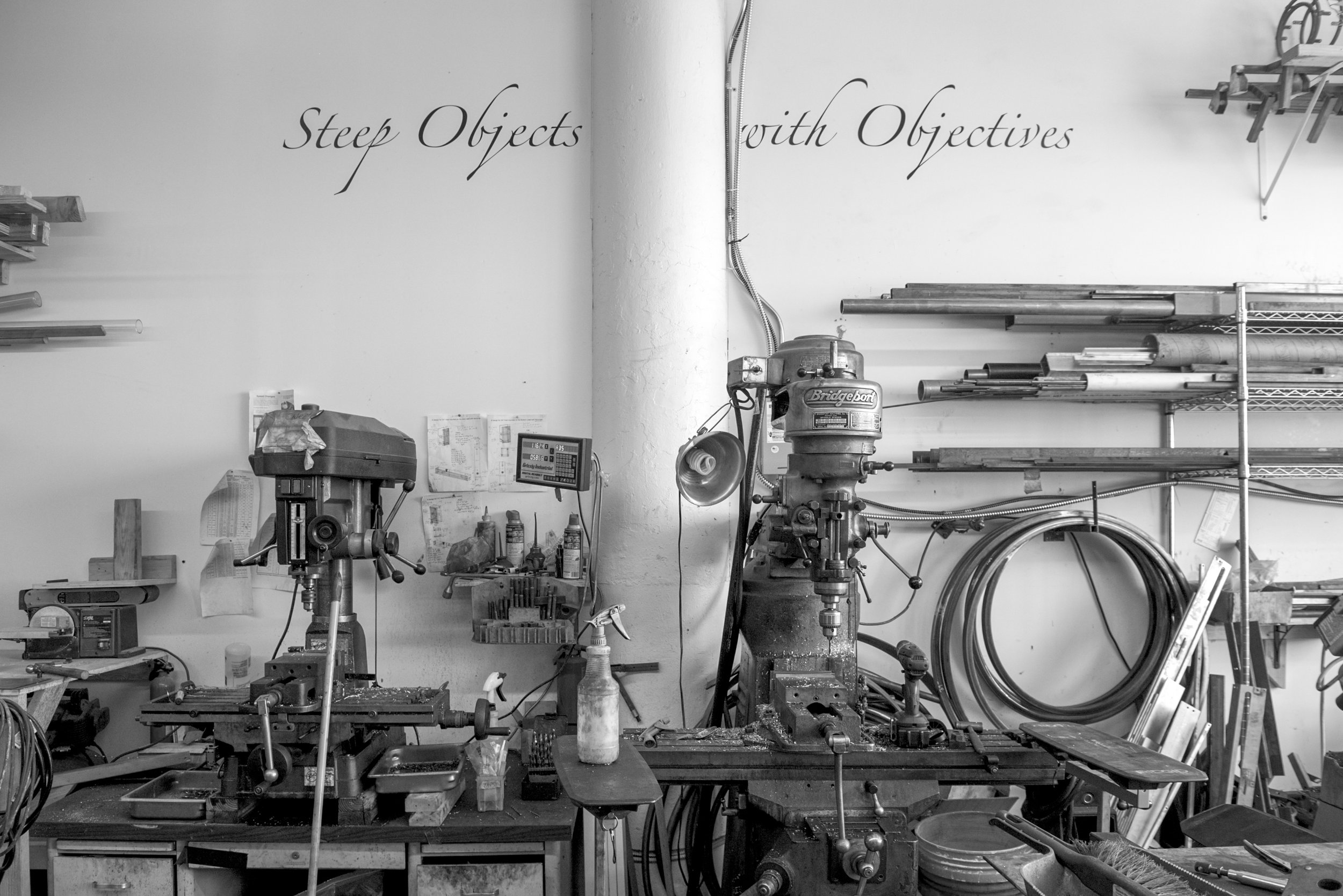
Mission
The Gamelatron’s mission is to create viscerally-powerful encounters with resonance through visually compelling works of art. It strives to create a harmony in the tension of fusing the East and the West, the modern and the ancient. The Gamelatron’s wide array of mediums, materials and fabrication processes tells a story of human innovation spanning a millennia. The Gamelatron Project re-contextualizes tradition and grants artistic license to creatively re-engineer its potential role in a changing society. Principal artist Aaron Taylor Kuffner uses exhibitions of the Gamelatrons to create sanctuaries both in public and private spaces. He views the body of the work as an offering to the observer.
Aaron Taylor Kuffner is an American born conceptual artist, based in New York. Kuffner’s dynamic work reaches far outside conventional forms of representation: it actively engages its audience and pushes art to serve society. His pieces often take the form of multi-year projects that require in depth research, collaboration with field experts and the development of new specialized skill sets. Each project provides unique conceptual tools that further the evolution of consciousness through the experience of beauty and the sublime.
History
For over a decade, conceptual artist, sculptor, and composer Aaron Taylor Kuffner immersed himself in the study of Indonesian Gamelan music. While living for several years in Java and Bali he learned to play the Gamelan, researched the process of making the instruments, cataloged various tuning modalities, and developed his own electronic notation system, all the while gleaning gamelan’s cultural and spiritual significance. In 2008, shortly after returning to New York he was awarded an Artist in Residence with renown engineer and technologist Eric Singer at the League of Electronic Musical Urban Robots. The fruit of their collaboration would be the construction of the first Gamelatron, fully realized in September of 2008.
Over the last 17 years Kuffner has built more than 100 Gamelatrons of various sizes, instrumentations and intentions. The collection of Gamelatron works are shown in diverse settings around the globe ranging from museums to retreat centers, spas, private homes, unique public spaces, educational institutions, cultural centers and at exceptional events.

Production
The instruments, robotic mechanisms, and sculptural mounting systems are all handmade. The instruments used in Gamelatrons are either archival, or commissioned to be made by master craftsman in Java and Bali, or made by the artist. The bronze instruments are made from upcycled copper and tin, forged into shape and tune. Instruments final tuning and surface finishing, as well as all machining, metal and wood work is done in Brooklyn primarily out of Aaron Taylor Kuffner’s studio. Gamelatron’s feature proprietary hardware and software developed with industry leading technologists: Eric Singer (beta versions), Lumigeek (Joe Martin and John Parts Taylor) and Mark Slee. All compositions are written and performed by Aaron Taylor Kuffner. Scores are unique for every gamelatron artwork and are often site responsive composed after installation.

Noted Exhibitions
Heron Arts, San Francisco, CA 2021, 2022, 2023, 2024
Wonderspaces, Scottsdale Arizona 2023-25
Seed Gallery at a16z, San Francisco 2024
Hero at Rockefeller Center, NYC 2023-24
World Trade Center Tower 2, Jakarta, Indonesia 2022-23
ISA Gallery at Wisma 46, Jakarta, Indonesia 2021
Lyman Allyn Art Museum, New London, CT 2021
Oakland Museum of California 2019 – 2020
Academy Art Museum, Easton, MD 2019 – 2020
Center for the Arts, Jackson Hole, WY 2019
Cincinnati Art Museum, 2019
ISA Wijaya, Jakarta, Indonesia, 2018
Münchner Stadtmuseum, Munich, Germany, 2018
Smithsonian Institute Renwick Gallery, DC 2018
Crossing Art, Chelsea, NY 2018
The Hammer Museum, Los Angeles, CA 2017
The Chimney, Brooklyn, NY 2017
The Drawing Center, Soho, NY 2016
The New York Hall of Science, Queens, NY 2015
The 56th Venice Biennale, Palazzo Grimani 2015
The Chimney, Brooklyn, NY 2015
Ace Hotel, New York, 2014
Hudson Valley Museum of Contemporary Art, 2014
Smithsonian Institute Sackler Gallery, DC 2013
Sundaram Tagore Gallery, Hong Kong 2013
Times Square Alliance, New York 2013
Sundaram Tagore Gallery, Singapore 2013
The Clocktower Gallery, New York, NY 2012
Metro Toronto Convention Center, Toronto, CN 2012
TechShop Annex, San Francisco, CA 2011 – 2014
Music Box Shanty Town, New Orleans, LA 2011
The University of Colorado at Boulder 2011
Sundaram Tagore Gallery, Chelsea NYC 2011
Event Appearances
Summit Detroit 2025
Secret Club Soho and Chelsea 2023 - 2024
Governors Island Art Fair 2018
29rooms, NYC and LA 2018
Boom, Portugal 2010, 2012, 2018
Art With Me, Tulum, MX 2018, 2020
The Man Base, Burningman 2017
Portal, The Federal Hall, NYC 2016
Summit Series, Summit at Sea 2015, 2016
Symbiosis Gathering, Oakdale, CA 2015
Latitude, Sussex, UK 2015
Body and Soul Festival, Ireland 2013, 2015
Summit Series, Summit Outside 2013
The Temple at Burningman, Nevada 2011, 2013
PEX Summer Festival, Maryland 2009 – 2013
Electric Picnic, Stradbally, Ireland 2010, 2012
Fuji Rock, Niigata Prefecture, Japan 2012
Lightning in a Bottle, Irvine, CA 2010, 2012
The Joshua Tree Music Festival, CA 2010
University of Dayton Dayton, Ohio 2012
Proekt Fabrika Theater, Moscow, Russia 2010
Vozduh Hall, Moscow, Russia 2010
Experimental Sound Gallery, St. Petersburg, RU 2010
Apostista Music Forum, St. Petersburg, RU 2010
Telfair Museum, Savannah, GA 2010
The World Financial Center, NYC 2009
Pittsburgh Children’s Museum, Pittsburg, PA 2008
New Britain Museum of American Art, CN 2008
Grants and Awards
The Gamelatron Project has received grants and in-kind support from The Andy Warhol Foundation for the Visual Arts (through the Clocktower Gallery), The Trust for Mutual Understanding, Caramoor Center for Music and the Arts, The Experimental Television Center with The New York Council for the Arts, The League of Electronic Musical Urban Robots, Ableton Gmhb, The CEC Artslink, Scope Arts, Artist Wanted, The New Orleans Airlift, TechShop San Francisco, The Mid Atlantic Arts Foundation and The US Artists International partnership with the National Endowment for the Arts and the Andrew W. Mellon Foundation.

